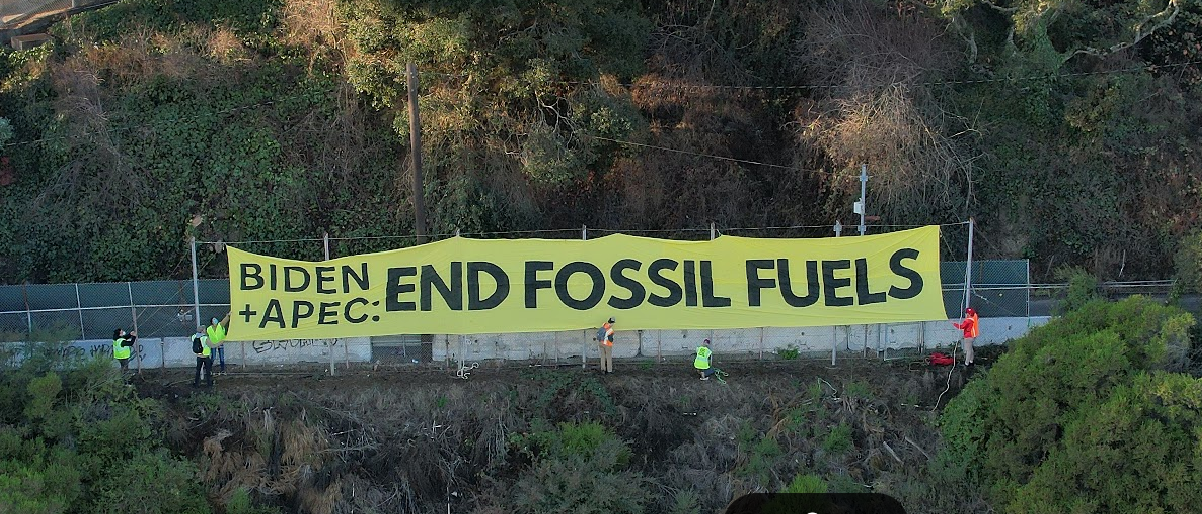
APEC summit: “Don’t trade away our future,” says civil society, demanding urgent action on climate
Starting this Saturday, the US will host the Asia Pacific Economic Forum (APEC) Leaders’ Week in San Francisco, entitled “Creating a Resilient and Sustainable Future for All.”

C: Brooke Anderson. APEC banner drop calling for an end to fossil fuels
Starting this Saturday, the United States will host the Asia Pacific Economic Forum (APEC) Leaders’ Week in San Francisco, entitled “Creating a Resilient and Sustainable Future for All.”
Dignitaries and heads of state from across Asia and the Pacific, including China’s President, Xi Jinping, will descend on San Francisco, along with tens of thousands of attendees from twenty-one countries.
It is hardly surprising that the APEC event will also feature a CEO summit with an estimated 1,200 CEOs, including those of big oil companies such as Exxon and Chevron, among others.
Both the heads of state and CEO meetings are the focus of mass civil society protests since they can potentially shape economic, environmental, and societal trends in the region for years, if not decades. There could be deals on trade and climate, which will have fundamental ramifications.
While talks between President Biden and Xi Jinping could dominate the news headlines, there is a real need for politicians from across the region to forge a clean energy pathway. Urgent progress on energy and climate is needed to help boost the all-important COP28 climate talks in Dubai, which will happen in a couple of weeks.
There are already concerns that the summit will do nothing to address climate change. According to the Sunflower Alliance, the summit is set to “greenwash the climate crisis and will do nothing to phase us out of an economy based on fossil fuels.”
There are worrying signs, too. The United States and thirteen other countries, including Japan, Indonesia, and Australia, plan to announce the conclusion of large parts of the Indo-Pacific Economic Framework (IPEF) trade agreement. According to the U.S. Government, the Framework “will advance resilience, sustainability, inclusiveness, economic growth, fairness, and competitiveness for our economies.”
It is poised to set binding rules governing a staggering 40 percent of the global economy under four pillars, such as clean energy and trade. Set to be a template for subsequent trade pacts, IPEF will have major impacts on climate policy, worker rights and more for years to come.
It is difficult to see how the main actors will push for progressive climate policies. The meeting is a get-together of many of the world’s largest “Planet Wreckers.”
According to a recent OCI analysis, among the 21 APEC countries, 3/5 of the 5 global north countries with the greatest economic means to rapidly phase out production are responsible for a majority (51 percent) of planned expansion from new oil and gas fields through 2050.
The biggest planet wrecker in chief is the U.S., accounting for more than one-third of planned global oil and gas expansion through 2050. Australia is the 3rd largest expander and Canada is the fourth largest.
Meanwhile, Japan is working to derail the energy transition in Asia through its so-called “Green Transformation” policy, which calls for the expansion of LNG and gas and other fossil-based technologies like ammonia co-firing, hydrogen and CCS. The Japanese government is the world’s 2nd largest provider of international public finance for fossil fuels, spending $6.9 billion on gas, coal and oil projects each year on average from 2020-2022. Japan is second only to Canada.
Biden will not just be meeting with the Chinese government. One other potentially important bilateral meeting will be with Indonesia, which sees this as an opportunity to reach an agreement with the United States regarding transition minerals investment.
As one of the countries that holds the largest critical mineral reserves in the world, particularly nickel (with 21% of the world’s reserves), Indonesia faces challenges due to the United States’ Inflation Reduction Act (IRA) Law and its requirements on standardization.
Biden can take advantage of bilateral meetings with Indonesia to emphasize the importance of creating a new equilibrium in the transition minerals supply chain. Amnesty International and others have long highlighted issues of transition minerals, although predominantly in Africa, ranging from ecological issues to the use of child labor.
In Indonesia, the same issues exist. The repercussions of corporate standards that neglect environmental concerns in the industry have inflicted hardship on local communities, jeopardizing their well-being. This has given rise to a spectrum of issues, encompassing health hazards, diminished local income, and violations of human rights. In recent years, nickel mining companies have been marked by a series of incidents, spanning from worker riots and disputes to work accidents to union busting and wage disparities.
There are at least three fundamental things Indonesia must do in order to fulfill criteria for the IRA. Firstly, it needs to improve ESG standards and governance of Indonesia’s critical minerals sector. Secondly, Indonesia must seriously decarbonize its captive power plants. Thirdly, Indonesia must make improvements to existing ESG guidelines in the country more generally.
It is hardly surprising that civil society is mobilizing ahead of the summit, calling on the U.S. to reverse its disproportionate role in creating the climate crisis, by no longer propping up the fossil fuel industry. In addition, civil society is calling on the U.S and all members of APEC to commit to climate justice for communities of color and take action to end the disproportionate impact climate change has on communities of color in their own nations and globally.
To coincide with APEC, there will be a People’s Countersummit on November 11 and a march and rally the following day.
According to Susanne Wong, from OCI: “Japanese Prime Minister Kishida and President Biden are lighting the world on fire with every new fossil fuel project they approve and finance. We demand that APEC leaders commit to a fast, fair and equitable fossil fuel phaseout and stop placing profits over people and our planet.”
